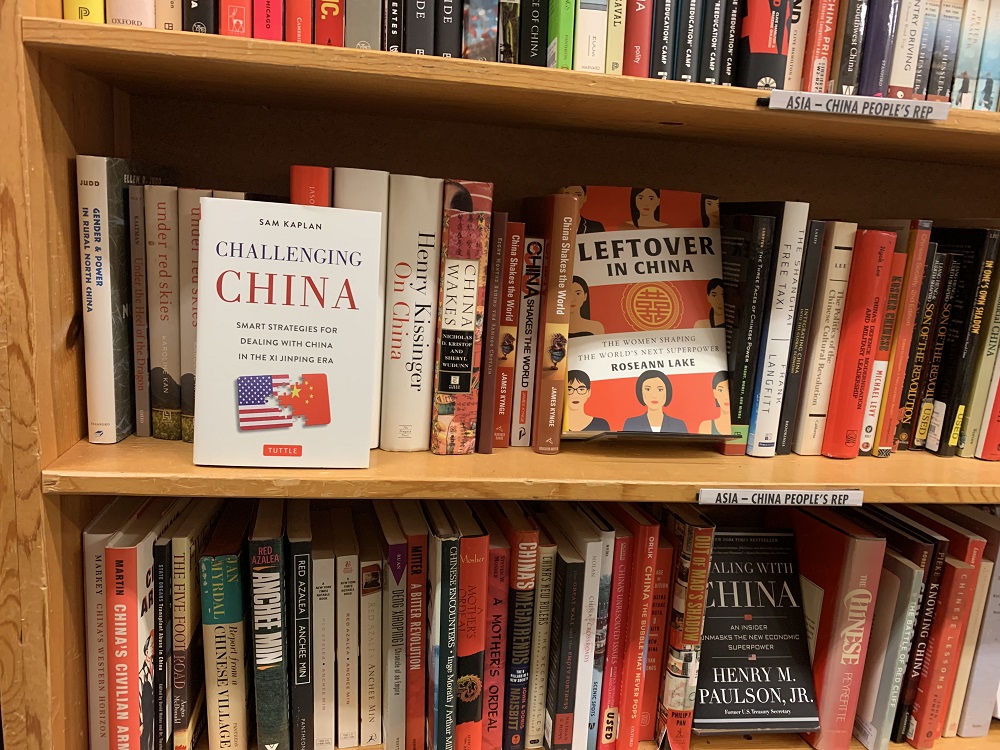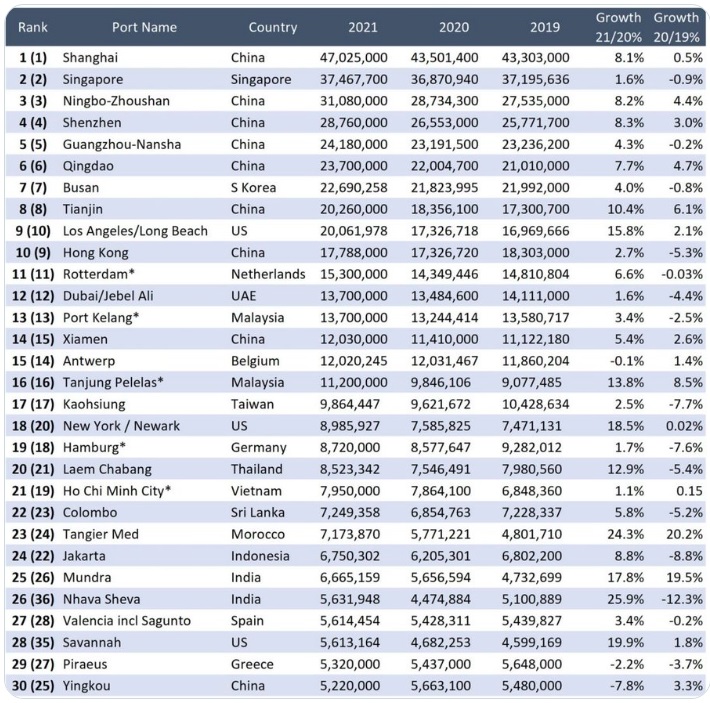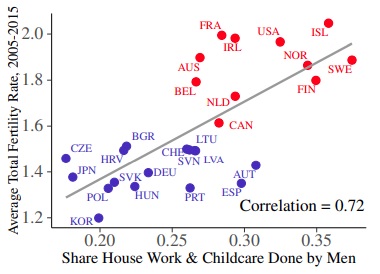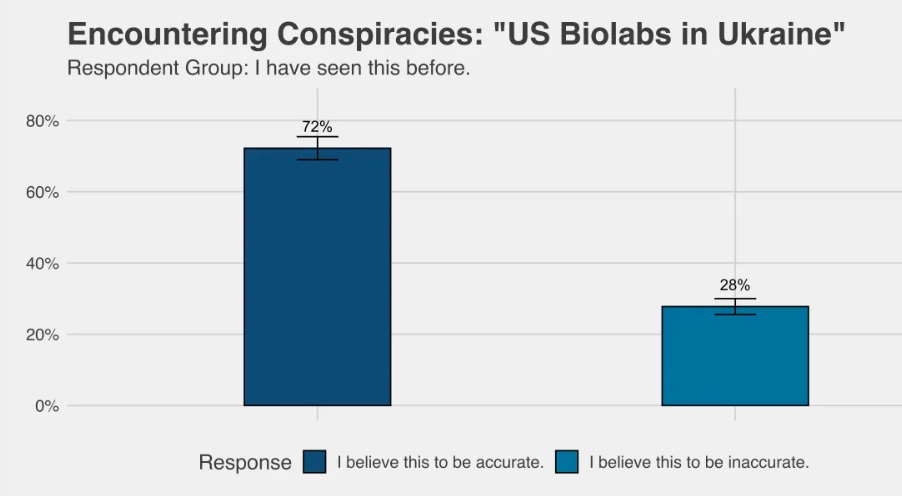Weddings are a joyful occasion, a chance for family and community to come together as two people make vows to unite for life. The recent wedding of our niece in Oregon was certainly filled with such joy, but so, too, was our trip to Powell’s Book Store in Portland on the way to the wedding, as was our conversation with the artist husband of another niece. For different reasons. It is always a joy to visit Powell’s, one of the largest and most esteemed book stores in the world, but it was especially edifying on this trip, our first since the pandemic began, because we were able to see our book, Challenging China, on one of its many shelves For us, our book in Powell’s is like having a movie screened in Cannes. Shortly after returning from the wedding we received our first Spanish-language review of our book, courtesy of Silvia Mercado, in Vision Liberal. We’ve been studying Espanol for about a year and a half and could read the review just well enough to understand she praised our book. Muchas gracias.
With such joy in our heart, at the wedding reception we sat down and conversed with the new groom of the other niece we mentioned. Uriah is an artist. A very talented one. He is now exploring the world of NFTs, and recently had a meeting with some prominent NFT folks. He patiently explained technically how he was creating the NFTs, which we understood, and found very cool. We, however, don’t understand the general world of NFTs. But nor should we. Tomorrow’s world is for people like Uriah, a young twenty-something. It will be a shame if the 2030s, 40s and 50s are easy for old people to understand. The world must move on. We are filled with joy to see it doing so. With some elation we call for a diversification of supply chains, point out fathers role in fertility and question Chinese Russian conspiracy theories. It’s this week’s International Need to Know, the groom of international information, the bride of international data.
According to many Powell Book’s customers, Challenging China is better, more fun and certainly shorter than Kissinger’s tome, On China, that sits next door on the shelf. Plus the author is cuter and not responsible for nearly as many deaths. Don’t press us on which Powell’s customers say this.
Without further ado, here’s what you need to know
We Need to Diversify Supply Chains (Part 17)
Diversity is good says the bizarro Gordon Gekko. In our talks on China over the last year, we have stressed the need to diversify global supply chains, both for resiliency and geostrategic reasons. Global supply chains have held up better than people realize during the pandemic and saved us through vaccines and treatments that are only available because of global supply chains. But we would do better still if so much of our global supply chains weren’t centered on one country ruled by an authoritarian government. Below is a list of the largest shipping hubs. Note that seven out of ten are in China. We are not in favor of general decoupling from China but there is no doubt we need to diversify the supply chain. Too many finished products and components are manufactured in China. This has been a problem throughout the pandemic and is becoming so again as Shanghai and other parts of China shut-down over Omicron outbreaks. There are likely to be large economic and supply chain disruptions in the coming months due to China’s zero-Covid policy. Not only are too many goods and components manufactured and assembled in China but so too are the big boxes that are used to ship these goods in. Yes, almost all containers, the twenty-foot-equivalent boxes you see on ships, are made in China. Slowly, as China became more expensive, manufacturing and assembly was diversifying out of China. That is likely to speed up for a variety of reasons, or at least should. More on this next week.
Fathers For Fertility
Our continued obsession with demography drove us to read a new economic paper on the causes of lower fertility (hat tip Marginal Revolution). With the exception of Africa, most of the world is headed towards declining populations with a variety of negative and positive consequences. A number of countries are trying to reverse their falling fertility rates without success thus far. But the causal relationships in fertility are changing, according to this paper. Previously, as incomes increased and education for women increased, fertility rates fell in a country. But, this is no longer true in high income countries. It still holds in low income countries. This reversal of causation is presumably additional incentive for low and mid income countries to continue to aspire to high income status. Interestingly, for high income countries, how much a father is engaged in child rearing is important to raising fertility rates. “The five countries with the highest male contribution to housework and childcare all have a fertility rate of 1.8 or higher. Conversely, the five countries with the lowest male contribution all have fertility rates below 1.5. Overall, the correlation between the male share of housework and childcare with fertility exceeds 0.7.” If a country wants to increase its fertility rate, perhaps it is fathers we need to look to, not mothers.
China Corner: Chinese Conspiracy Theories
We always take opinion surveys of Chinese with a large tablet of salt, enough to fully salinate Lake Superior. In a society ruled by an authoritarian government (increasingly authoritarian as people trapped in locked down apartments can testify) respondents cannot help but to try to answer the way they think their government wants them to think rather than what they may actually think. The Canadian survey firm, RIWI, tries to obtain better data in countries such as China* by using expired websites that users accidentally stumble upon. An innocent Chinese Internet user who clicks on one of these websites is offered to take a survey. Of course, a Chinese web user may still be worried that though the survey is supposed to be anonymous, China’s government is still peeking somehow. Nonetheless, the survey offers data to ponder. This survey, commissioned by the Carter Center, asks about Chinese support for Russia and about whether Chinese believe in the conspiracy theory propagated by both the Russian and Chinese governments that the U.S. operates biolabs in Ukraine. On this latter question, a majority of Chinese believe in the conspiracy and of those who were aware of the conspiracy theory before taking the survey, 72 percent believe it. In addition, the survey found that higher educated people were more likely to believe the conspiracy. Females less so than males. Those in America and Europe arguing for censored social media platforms in the West, may want to examine this survey carefully.





